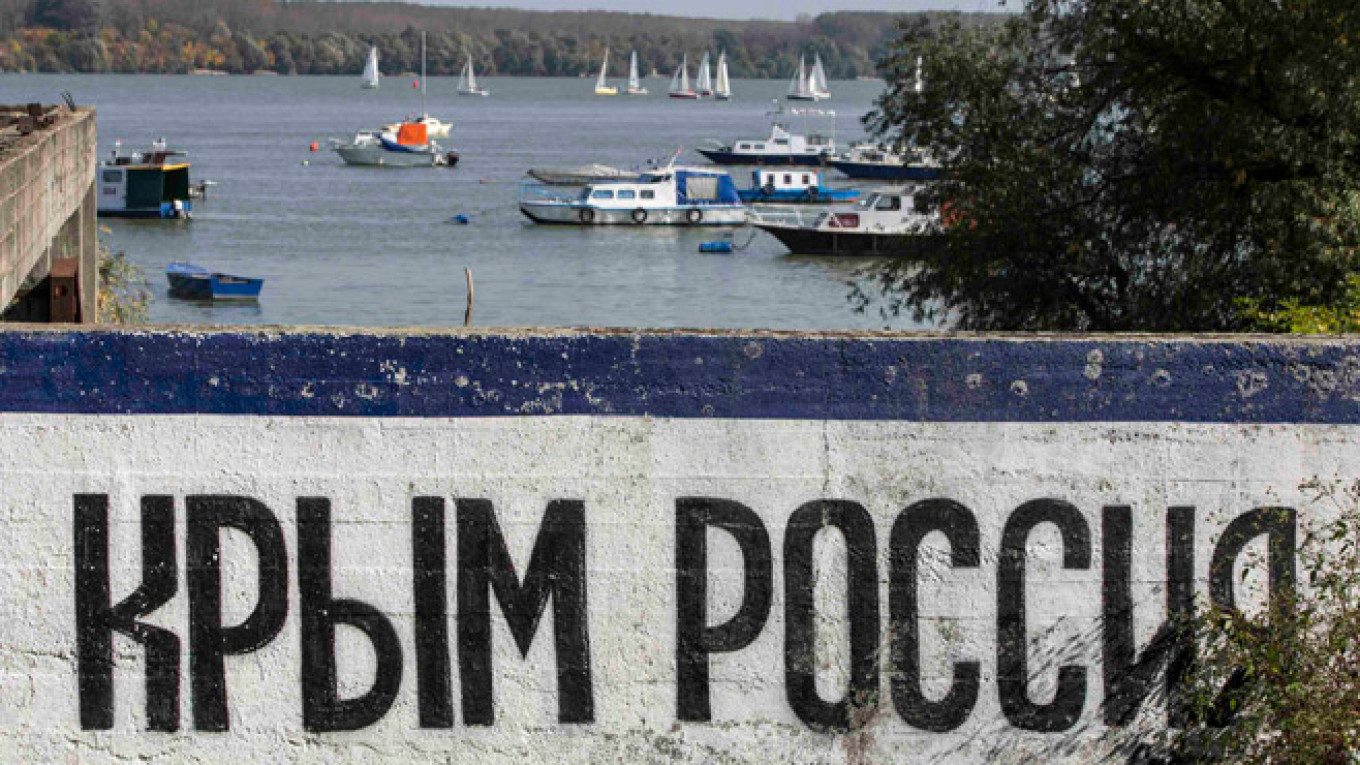The annexation of Crimea was clearly illegal and contrary to international standards. The United Nations General Assembly passed a resolution to that effect on March 27, 2014, and the international community will always consider Crimea a part of Ukraine no matter how the Russian authorities might try to prove otherwise.
And yes, Ukrainians are right when they say Crimea is an occupied territory. However, a few questions arise in this regard. If Crimea is under occupation, where are the Ukrainian resistance fighters? When the Germans invaded Ukraine in 1941, local guerrilla forces — including those in Crimea — were a bit more active in their own defense.
Where are the mass protests from local citizens? Where is the powerful movement to return Crimea to Ukraine? Why did Ukrainian officers so readily swear allegiance to Russia's armed forces? All of the local leaders continue at their former posts and the police have shed their Ukrainian uniforms in favor of Russian insignia. Pensioners are jubilant: Russia has tripled their pensions.
If Russia had not seized Crimea so easily, perhaps President Vladimir Putin would not have ventured into eastern Ukraine. When the Federation Council first authorized the use of Russian troops on Ukrainian territory on March 1, in addition to Crimea, senators listed a number of cities as the target of that invasion: Donetsk, Luhansk, Kherson, Dnipropetrovsk, Kharkiv and Odessa.
In fact, Russia initially planned to send troops into almost all of eastern Ukraine. It is no secret that Kremlin-controlled media aired the movie "The Russian Spring" from morning until evening in those cities. Pro-Russian activists dumped the Ukrainian flags flying in those towns and replaced them with the Russian tricolor. Residents were certain that Russian troops would arrive any day.
Then Malaysia Airlines Flight MH17 was shot down, prompting a sharp reaction from the international community. Putin decreased military aid to the pro-Russian separatists for a month afterward, which the Ukrainian army successfully exploited by recapturing three-quarters of the occupied territories.
Then on Aug. 24, Putin made up his mind and sent Russian army groupings into Ukrainian territory. The Russian offensive was moving quickly, but at the insistence of Europe, both sides met in Minsk to sign a cease-fire. The conflict was frozen, and the demarcation and demilitarization of the border between the main part of Ukraine and the eastern part occupied by pro-Russian forces began.
Many Ukrainians have concluded that their country has now lost not only Crimea, but also irretrievably lost the eastern Donbass region.
Of course, Ukraine cannot rejoice over its territorial losses, but Kiev might look for the positive side to this situation. Apart from the fact that a cessation of the bloodshed is in itself a good thing, it is also worth remembering that Crimea and the Donbass are economically undeveloped regions that survived largely on subsidies from Kiev. Now that heavy economic ball and chain is hanging on Putin's ankle.
The Russian budget, weakened by Western sanctions, is beginning to totter under the weight of having to support Crimea — and now the Donbass is reliant on Russian subsidies as well. Ukrainians need to face the truth: They must live in a divided nation in the same way as Germans once did and as Koreans live to this day. Ukraine can only hope to reunite its poverty-stricken eastern and southern regions if it can achieve economic success and woo those citizens back in the same way that East Germans dug holes under the Berlin Wall in hopes of fleeing to the more prosperous West.
But to do that, Ukraine will have to eliminate corruption and implement reforms. If Ukraine fails to improve its economy, it cannot hope to regain its lost territories.
Andrei Malgin is a journalist, literary critic and blogger.
A Message from The Moscow Times:
Dear readers,
We are facing unprecedented challenges. Russia's Prosecutor General's Office has designated The Moscow Times as an "undesirable" organization, criminalizing our work and putting our staff at risk of prosecution. This follows our earlier unjust labeling as a "foreign agent."
These actions are direct attempts to silence independent journalism in Russia. The authorities claim our work "discredits the decisions of the Russian leadership." We see things differently: we strive to provide accurate, unbiased reporting on Russia.
We, the journalists of The Moscow Times, refuse to be silenced. But to continue our work, we need your help.
Your support, no matter how small, makes a world of difference. If you can, please support us monthly starting from just $2. It's quick to set up, and every contribution makes a significant impact.
By supporting The Moscow Times, you're defending open, independent journalism in the face of repression. Thank you for standing with us.
Remind me later.






